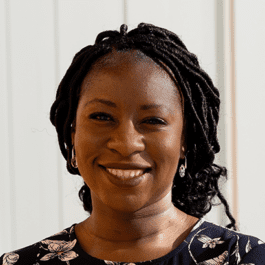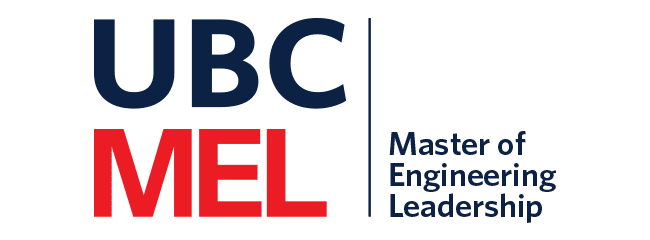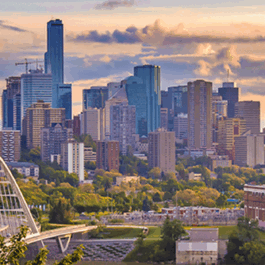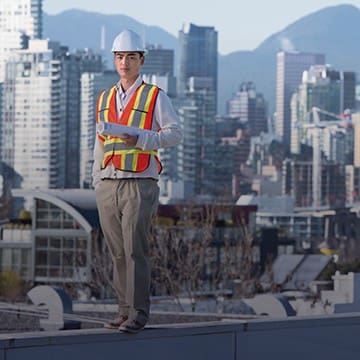
Urban Systems — Daphne Mazarura
Alumna Story — Daphne Mazarura

For Daphne Mazarura, the MEL in Urban Systems has expanded her education and professional experience in planning, giving her the technical knowledge to implement sustainable solutions in urban infrastructure projects.
With a degree in urban and regional planning from Ryerson University in Toronto, Daphne Mazarura worked as a planning intern with the Kehilla Residential Programme, a community housing agency. Here she delved into a range of affordable and accessible housing initiatives, which included an in-depth project on socially inclusive design.
“This particular project focused on high-rise rental buildings and explored ways to better accommodate people with developmental disabilities that would give them more opportunities for independence,” she says.
Daphne pursued a graduate degree to expand her knowledge in planning for infrastructure-deficient communities and community transformations relative to infrastructure system life cycles and changing values.
“I felt that my planning background could be enhanced with a thorough understanding of the challenges that architects and engineers face in the design, creation and maintenance of sustainable urban infrastructure,” she says. “You can bring so much more to the discussion when you have technical familiarity with the economic implications of urban systems and the efficiencies presented by their interdependencies.”
A multidisciplinary, multiprofessional program
The Master of Engineering Leadership (MEL) in Urban Systems degree appealed to Daphne for its multidisciplinary approach. Bringing together instructors from the Faculty of Applied Science, UBC School of Community and Regional Planning and UBC Sauder’s Robert H. Lee Graduate School, the program attracts students from diverse professional backgrounds, including engineering, architecture, urban planning and more.
“This mix of professionals actually replicates the kind of teams that come together to deliver urban projects, making for a very valuable educational experience,” she says.
“The program expanded my knowledge and the Urban Systems classes brought together not only planners like me, but also engineers who tend to bring a very technical and detailed lens to the conversation. Through our discussions and group work, we both had so much to offer and learn. As a planner, I had to pay more attention to the technical feasibility and numbers of projects. Similarly, it was important for engineers on the team to step back and think about the high-level impacts of design decisions and planning on the lived experience of various community members.”
The MEL’s technical courses, which make up 60 percent of the curriculum, are grounded in practical experience. In the Urban Systems Engineering course students examined the technology and management of various urban systems in conjunction with field trips. For example studying transportation systems was followed by a visit to a SkyTrain facility where students engaged with staff and professionals about the system’s operations.
“For one project we co-created an integrated storm water asset management plan for a local municipality with a team made up of an urban forester, an engineer and a planner,” says Daphne.
“This type of group work expanded my interprofessional network – and I certainly know who I can collaborate with on various endeavours in the future.”
When it came to the business courses, Daphne says she enjoyed taking the classes alongside all of the MEL and Master of Health Leadership and Policy students. On a particular assignment for an Organizational Leadership class, teams with engineers and health professionals investigated innovative solutions to reduce health-care-associated infections in hospitals.
“Not only did the classes prepare us for management positions, but we also learned how to produce innovative solutions under significant time constraints.”
An expanded skill set and optimism for the future
After graduating in December 2019, Daphne took time off to travel to South Africa and then returned to Vancouver to focus on finding a suitable role in her field. Although the COVID-19 pandemic has seen organizations putting hiring decisions on hold, Daphne says she has had the chance to sharpen her skill set with project management courses, while also analyzing community resiliency and the health implications of urban infrastructure amidst the pandemic. Daphne is confident that as restrictions are lifted she will find a role aligned with her values and skills.
“The MEL has put me in a stronger and more confident position in my career to make a positive impact in community development and evolution,” she says.
“My expanded skill set has tremendously increased the value I can bring to a much broader range of employers. Having both technical and business knowledge gives me a unique perspective and allows me to see the broader picture, thereby contributing strategically on urban systems project teams.”
–
Take the steps to join the next cohort of engineering leaders. If you haven’t already, assess your eligibility and sign up for the upcoming information session to learn how to submit a strong application. Learn more about this innovative master’s program:
Application Deadlines
The online application portal for the January 2025 has closed.
Get ready to apply!
Admissions for the 2026 intake will open on January 1, 2025.
How to ApplyJoin us for an
Info Session
Sign up for our latest online information sessions and discover what our programs have to offer.
Sign Up NowAssess your Eligibility
Determine if your professional experience and academic background make you a fit for your desired program.
Start AssessmentApplicant Guide
Navigate the application process with ease!
Sign up to receive tailored instructions and a detailed guide directly to your email.
Sign up


